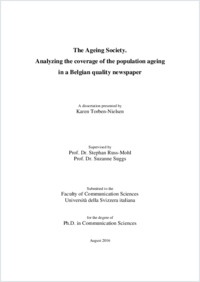The ageing society : analyzing the coverage of the population ageing in a Belgian quality newspaper
- Torben-Nielsen, Karen
- Russ-Mohl, Stephan (Degree supervisor)
- Suggs, Suzanne (Degree committee member)
-
19.09.2016
183 p.
Thèse de doctorat: Università della Svizzera italiana, 2016 (jury note: Magna cum laude)
English
This study has examined how the ‘Ageing Society’ -a society with a rapidly ageing population, a growing share of older persons and a decreasing share of younger persons- and its implications for the Belgian population are represented in the Belgian quality newspaper De Standaard (2011-2013). As such, the study delivered first-time Belgian empirical findings about the coverage of the Ageing Society. For most people, media are a central information source and an important factor in their opinion building. It is therefore highly important to increase the knowledge regarding the Ageing Society-media coverage they are provided with, and will possibly act upon. The study has applied a mixed methods approach. First, a qualitative content analysis inductively identified the labels and frames in the Ageing Society-coverage. Subsequently the frequencies of these labels and frames have been assessed. This two-step approach allowed identifying new labels and frames while considering their individual importance in the coverage as well. The Ageing Society mostly appeared in the newspaper De Standaard as a threat for the public budget, labour market and health- and social systems. The newspaper dominantly applied political- and economic frames to cover the Ageing Society, and hence established the Ageing Society mainly as a political-economic concern. Frequently applied as well in the coverage of the Ageing Society was the health frame. To a much lesser extent, the Ageing Society was also framed in terms of education and awareness. Several Ageing Society-related topics appeared seldom in the coverage; e.g. the (non- financial) contributions of older persons to society, the connectedness between the various generations, the implications of the Ageing Society for the individual and the human-made element in population ageing. Also, the dominant normative perspective of the Ageing Society as threat for the welfare state excluded other, more positive perspectives. Such perspectives could nevertheless complement the existing coverage by exploring the opportunities of the Ageing Society, and reporting about alternative policies to address its implications. The policies to address the Ageing Society were critically reflected upon in the newspaper’s comments and opinion articles. Most of these opinionating articles nevertheless did not attribute responsibility to specific persons or instances deemed accountable for addressing the Ageing Society. Sources for the Ageing Society-coverage in De Standaard were mainly professional experts, such as politicians or researchers. Other potential non-professional expert sources, such as representatives from the civil society, communities or individual (possibly ageing) persons were less represented. The research findings and theoretical insights have been translated into journalistic recommendations for a more varied and balanced media coverage of the Ageing Society.
- Language
-
- English
- Classification
- Social sciences
- License
-
License undefined
- Identifiers
-
- RERO DOC 308923
- URN urn:nbn:ch:rero-006-117107
- ARK ark:/12658/srd1318887
- Persistent URL
- https://n2t.net/ark:/12658/srd1318887
Statistics
Document views: 484
File downloads:
- Texte intégral: 296
